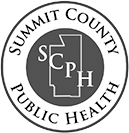Petting Zoos
Petting zoos can be permanent premises or traveling mobile events where contact is permitted between animals and members of the public. They can be fun and educational while allowing people of all ages the opportunity to interact with and learn about animals they may not see in their daily lives. However, it is important to remember that animals can carry germs that can make people sick. These germs can be spread through direct contact such as petting or feeding the animal, or indirectly from germs throughout the petting zoo environment such as on gates or fences. To protect the public from potential diseases when interacting with animals in a public setting, Summit County permits and inspects Petting Zoo operations in our jurisdiction.
Staying Healthy at Petting Zoos
You can help protect yourself and your family by taking precautions during visits to a petting zoo
- Wash your hands right after leaving the animal areas, even if you didn’t touch the animals. Running water and soap are best, but if they are not available, use an alcohol-based hand sanitizer that contains at least 60% alcohol and wash your hands with soap and running water as soon as you can.
- Don’t eat or drink around animals. Keep all food and drinks away from the animal areas. Leave items like strollers, pacifiers, cups, or toys outside the exhibit.
- Always supervise children around animals. Children under 5 years old should not touch reptiles, amphibians, or poultry because these animals are more likely to make them sick.
If you have concerns with a petting zoo in our area, or questions regarding zoonotic disease, please contact our office at 330-926-5600 or view more information from the following links.
- CDC: Stay Healthy at Animal Exhibits
- Ohio Department of Health: Zoonotic Disease Program
page updated 2/26/2024
